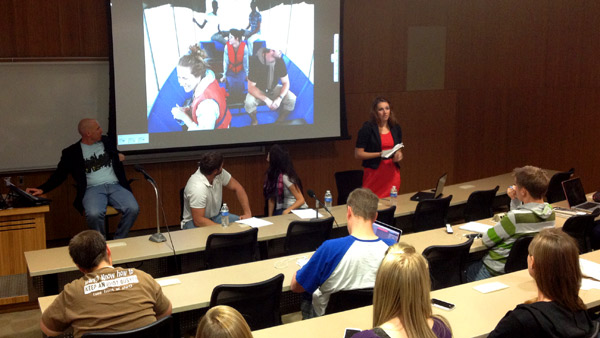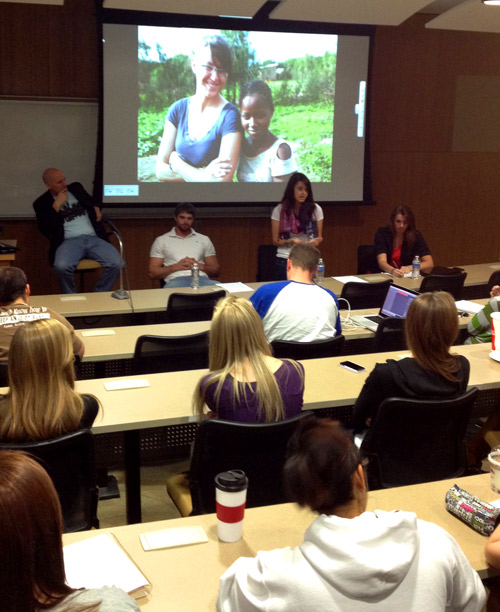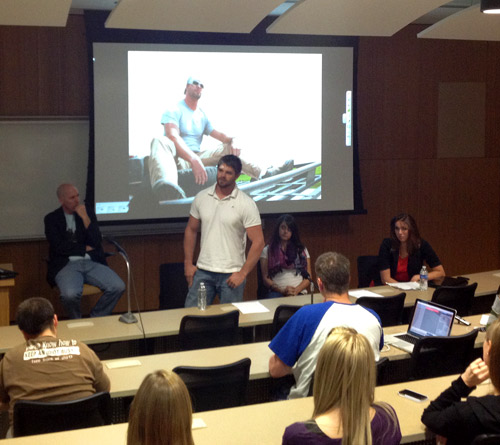Aggie journalism students tell stories of hope & heartbreak from Africa
October 5th, 2012 Posted in OpinionLOGAN—The importance of beer in interviewing, needy street children and bathrooms without toilet paper were all topics of conversation Wednesday when three student-journalists shared their experiences from a reporting trip to Ethiopia.

JCOM student Mackinzie Hamilton reads from her story on Ethiopian street kids during Wednesday’s Media & Society event. Ted Pease photo
Journalism Professor Matthew LaPlante visited Ethiopia in 2011 with Salt Lake Tribune photographer Rick Egan to report on a tribal custom of infanticide called “mingi.” This past summer, LaPlante took three of his students back to the east Africa nation to pursue their own stories in Ethiopia.
“It was a big challenge. It was kind of an audacious challenge,” LaPlante said. “It wasn’t cheap, for one thing. The plane ticket alone, I think was $2,500-$2,600. These students funded a driver, a translator, gas for a truck that guzzled it like a Big Gulp.
“It was a big financial commitment, and it was a time commitment, and it was a comfort commitment, and they did it all for the promise of telling a story that hadn’t been told before. And I’m very, very proud of these journalists.”
JCOM students MacKinzie Hamilton, Danielle Manley and Dale Nicholas comprised the Aggie reporting team in Ethiopia, and they regaled an auditorium-full of students and faculty about their experiences—both the good and the bad, the enjoyable and challenging—as they sought out meaningful stories in the “land of hope and heartbreak.” As part of their presentation for the first Morris Media & Society Lecture event of 2012-2013, each of the student journalists read from their news stories—on street kids, Ethiopian distance runners, and Ethiopian war veterans—as LaPlante’s photos from the trip flashed behind them on the screen.
Hamilton, a 19-year-old from Providence, said she connected with a member of the LDS church, Jason Burton, who has lived in Ethiopia for eight years with 20 orphan boys. After her initial story idea—working with non-governmental organizations that serve street children—fell through, she said Burton and his Ethiopian “street children,” became her new focus.
“He’s put so much on hold—his higher education, he’s put marriage, career plans, everything on hold—because he believes so much in this,” Hamilton said of Burton. “But at some point, people are accusing him of being kind of like a Peter Pan—a leader of a group of ‘Lost Boys.’”
She said Burton has a tough decision to make concerning whether he stays in Ethiopia or returns home to the United States.

Journalism student Danielle Manley tells of her story about Ethiopian runners, which appears on Yahoo! Sports. For thousands of Ethiopians, distance running is like the Superbowl, she said, a way to escape poverty. Ted Pease photo
Manley and Nicholas agreed with Hamilton when she said it was hard to come back to America after spending two weeks immersed in a new culture. “I could have stayed there for two months,” Nicholas said.
They all looked forward to taking showers and sleeping in their own beds, of course, but there were so many places and people to see and talk to that it was hard to leave, Manley said.
Yahoo! Sports recently published Manley’s story on its thepostgame.com website. She wrote a focus story on Ethiopian athlete Kababa Alemu, who, she said, hopes to become a professional runner in order to lift his family out of poverty.
“Most Ethiopian athletes begin training shortly after they can walk, and many are training in earnest by the time they are 10,” Manley said, as she read an excerpt from her piece.
LaPlante asked Manley what she found most compelling about finding and telling her story.
“Let me explain this first: Running in Ethiopia is like the Super Bowl or NBA for America,” Manley said. “Running is their thing, and everybody runs. And even though there is like a one in a million chance that these kids that are in these impoverished situations making it, they still dedicate their whole day to running and training as hard as they can.”
Peering inside the lives and minds of residents of a country on the other side of the world had its rewards and its challenges. Getting used to interviewing through a translator came with a steep learning curve, Manley said. Nicholas agreed.
He said an interviewer’s natural instinct is to look at the translator in the eyes as they speak, however, that would be rude. It’s counter-intuitive, but he said it’s proper to look at the subject as the interpreter translates their words into English.
“Our translator had actually been a sniper from when they fought in Somalia,” said Nicholas, who served in combat in Iraq. “What helped me is, I think I was able to get those guys to open up a little bit more. I understood what they were talking about. I could look at two of the guys interacting and understand exactly what was going through their heads when they were talking to each other.”
Nicholas’ original story about a World Bank program had also fallen through, after he realized it wouldn’t be compelling enough.
“You’ve got to be flexible,” he said. “A lot of times your original plan will go to shit and you got to be able to adapt and overcome to it. Things are constantly changing. In a place like that, you can’t just pick up your phone and text somebody and find out where they’re going to be. You just have to find another angle or another source.”

JCOM student Dale Nicholas, an Iraq veteran, said he found a band of brothers in doing a story about Ethiopian war veterans. Ted Pease photo
He said he experienced only a moment of discouragement, until he realized he’d be able to report on a subject he knows only too well. That’s when he discovered his translator’s history as a military man, who introduced Nicholas to other veterans of Ethiopia’s civil wars. Nichols said he also learned new advantages to drinking beer.
“If you’re just sitting there talking to somebody, they’re going to feel uncomfortable, they’re going to want to get it over quick,” he said. “If you’re having a few beers, it takes them longer, obviously, [but] they’re going to get more relaxed, they’ll start seeing you on an equal level. It’s not like they’re just talking to somebody they don’t know. If you sit down and have a beer with them, you’ll start opening up to each other.”
Nicholas said he would have certainly spent another few months in Ethiopia if he could have. Manley and Hamilton nodded in agreement.
But the Aggie team’s hotel in Addis Ababa took some getting used to, Hamilton said—especially the fact that the bathrooms did not have toilet paper and the showers, “just a hose,” seldom had hot water.
LaPlante warned students about the outside-looking-in position journalists and other international travelers take when visiting countries abroad—a tendency to ethnocentricity.
“A lot of people, they have these international experiences and they say, ‘Oh, well, I really felt what it was like,’ and I hear a lot of you guys, you returned missionaries, and [you say] ‘I felt what it was like,’” LaPlante said. “Um, no we don’t. We don’t ever feel like what it’s like. You can eat with the people. You can scrounge with the people. You can live with the people. You can always go home. You can always go to something better.”
Wednesday’s session, “Ethiopia: Telling stories in the land of hope and heartbreak,” was part of the 2012-2013 Morris Media & Society Lecture Series, sponsored by the Journalism & Communication Department. Upcoming in the series: Justice Party presidential candidate Rocky Anderson on Oct. 26; and JCOM alumna and independent filmmaker Genéa Gaudet on Nov. 7.
TP
Tags: Dale Nicholas, Danielle Manley, Ethiopia, Mackinzie Hamilton, Matthew LaPlante, Morris Media & Society Lecture

Sorry, comments for this entry are closed at this time.